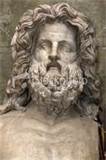I hope
everyone had a wonderful Thanksgiving (for those who live in the USA), and I hope
the rest of you had a wonderful week! Did anyone try the leaf molds? If you
did, I hope all turned out well.
There is one
more aspect concerning the long lives of the pre-deluge humans that I want to
touch upon: Is there any clues to the post-flood people’s reactions of those
who outlived their grand and great grand children? What did these great, great (and
even more greats) grand children think of a person who lived the same time as
their ancestors did?
As people’s
life spans became shorter and shorter, those who lived for several generations
would have become thought of as immortal. They would have been revered and held
in awe, even whispered that they could be gods.
And that is just what we see.
Egyptians, the
Romans and Greeks as well as many other cultures had many gods and goddesses
they worshiped. There was a deity for just about anything imaginable. Jupiter (the
master of all Roman gods), Mars (Roman god of war), Venus (Roman goddess of
love), Neptune (Roman god of the sea), Diana (roman god of the moon), Iris (Egyptian
goddes of the earth), Re (Egyptian creator god), Pan (Geek god of the mountains)
and Mithras (Persian-god of light), to name a few. And how about in China, where
ancestor worship is still prevalent in rural areas?
 Now when you
look at the records (in scripture) of humans that were born about two to three
hundred years following the great deluge, their life spans still numbered in
the hundreds of years. Thus, a person could speak with someone who was alive at
the same time their ancestor six or seven times removed lived. To this person,
the long-lived human would seem immortal, and would be hard not to worship. And
who knows…perhaps those long lived humans played the part up as well.
Now when you
look at the records (in scripture) of humans that were born about two to three
hundred years following the great deluge, their life spans still numbered in
the hundreds of years. Thus, a person could speak with someone who was alive at
the same time their ancestor six or seven times removed lived. To this person,
the long-lived human would seem immortal, and would be hard not to worship. And
who knows…perhaps those long lived humans played the part up as well.  Due to
genetics and environment, as we saw in the earlier blogs of this series, they
would appear young and vital for at least several hundred years. I don’t know
about you, but if I met someone still living who was born in the 1600’s, I would
be hard put to not be in awe of them-imagine all the questions they could
answer! It would be very easy, almost natural to deify them. But the mythology legends
do tell us these gods and goddesses not only lived, but died as well. Though they
were considered immortal, it was known that they could die or be killed. The
myths never did say they couldn’t die, just that they lived a long, long time. H-m-m-m,
sound familiar?
Due to
genetics and environment, as we saw in the earlier blogs of this series, they
would appear young and vital for at least several hundred years. I don’t know
about you, but if I met someone still living who was born in the 1600’s, I would
be hard put to not be in awe of them-imagine all the questions they could
answer! It would be very easy, almost natural to deify them. But the mythology legends
do tell us these gods and goddesses not only lived, but died as well. Though they
were considered immortal, it was known that they could die or be killed. The
myths never did say they couldn’t die, just that they lived a long, long time. H-m-m-m,
sound familiar? Thus we have
some idea of what the mythological ‘immortals’, our long-lived ancestors, were
and even how they lived.
Thus we have
some idea of what the mythological ‘immortals’, our long-lived ancestors, were
and even how they lived.
Isn’t it
wonderful how scripture and secular history comes together to reveal the ‘rest
of the story (history)’!
Until next
time, God bless and take care,
Willow Dressel
This week in
the skies: full moon on
Tuesday night, November 27, and “A weak penumbral eclipse of the Moon
occurs before and/or during dawn Wednesday morning for western North America.
The penumbra is the pale outer fringe of Earth's shadow. The Moon will
be deepest in it from 6:18 to 6:48 a.m. PST on Wednesday the 28th (14:18 to
14:48 on the 28th Universal Time). Look for a weak shading on the Moon's north
(upper right) side. The farther in from the West Coast you are, the brighter
the dawn and the lower the Moon will be.
“The
penumbral eclipse takes place high in the middle of the night for the
longitudes of Australia and Japan, in late evening of the 28th local date for
China and Southeast Asia, and early that evening for India with the Moon still
low in the east.”1
References:
1http://www.skyandtelescope.com/observing/ataglance
Answers in Genesis, The Tower of Babel, 2011. DVD

No comments:
Post a Comment